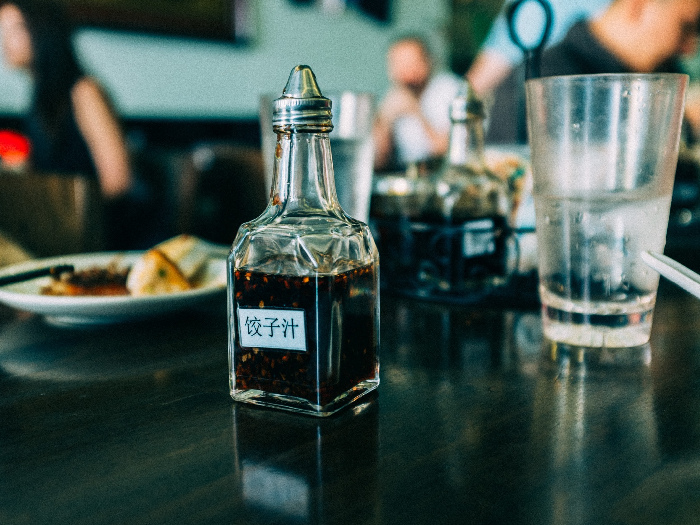Soy sauce is a staple of Chinese cuisine and has been in use since the last 2200 years. Prepared from fermented soybeans and wheat, soy sauce is the most popular soy product worldwide. The preparation process of the sauce can cause slight variations in its flavor, texture, and even health benefits and risks. In this article, we understand what is soy sauce, its types, nutrition, calories, benefits and more!
What is Soy Sauce?
Soy sauce, also known as soya sauce, is a liquid condiment, made from a preparation of soybean paste, roasted grain, brine, and koji. The word ‘soy’ comes from the Japanese word for soy, ‘shoyu’. Its taste is predominantly salty, followed by a moderate umami sweet taste, landing onto slight bitterness, as per a detailed paper published in the Soyinfo Center [1]in 2012.
There are two ways to produce this condiment, either by the traditional way of fermentation or through the chemical method of acid hydrolyzation. The fermentation method can take up to six months, giving it a delicate flavor and sweet aroma. The chemical method, on the other hand, is much faster as it involves the process of artificially breaking down soy proteins by hydrolysis. It only takes two days for completion.
Today, soya sauce is widely used and prepared around the globe from Japan and Korea to Europe and USA. According to the book ‘The Middle Kingdom‘ by Samuel Well Williams, soy sauce is prepared by skinning the beans, grinding them into flour, and then mixing the flour with water and turmeric. [2]

Soy sauce is known for its umami flavor, which makes it an ideal all-purpose seasoning. Photo Credit: Unsplash
Types
There are mainly three different types of soy sauce, light, dark, and thick. Let’s take a look at them. [3]
- Light Soy Sauce: Mainly used in Chinese recipes, this variety of soya sauce, also known as ‘usukuchi’, has a saltier taste than the other soy sauce varieties. It is thin in its texture and light reddish-brown in color. Light soy sauce is not to be confused with any other soy sauce with reduced salt or products carrying the label ‘light’ on them. It is usually used by Taiwanese and Chinese people for dips, marination, dressings, and stir-fry recipes, as it is known to enhance the flavor.
- Dark Soy Sauce: Dark soya sauce or ‘koikuchi shoyu’ gets its color from a longer aging process and mixing with molasses or caramel and cornstarch. It is thicker in texture and sweet and less salty in taste. You will often find Chinese and Taiwanese people using this sauce in stew type dishes like red-braised pork, beef, or chicken. Make sure you don’t use too much of this sauce in your recipes otherwise it would dye your food a dark brown color. [4]
- Thick Soy Sauce: The third variety of soya sauce is the thick soy sauce, also known as ‘tamari’. It is made with sugar and wheat and sometimes with a starch thickener. Thick soy sauce is sweet in taste and is usually added to stir fry food and dips. Taiwanese people also use it in pork rice and stews. It is often used as a substitute for oyster sauce in meals and can be easily prepared at home.
There are also a few other varieties of soya sauce, including Shiro and Saishikomi. Shiro is made mostly with wheat and contains only a few soybeans. Saishikomi, on the other hand, is made by breaking down wheat and soybeans with enzymes in soy sauce instead of saltwater. While the former is lighter in taste, the latter is heavier.
Shelf Life
Soy sauce has a particularly long shelf life, as long as the bottle is not opened – research suggests it stays for up to 3 years. Once you open the bottle, it’s best to consume soya sauce within a year or two at max, considering how long it was stored unopened. The long shelf life is given to the fact that this sauce contains a lot of sodium, making it quite a difficult environment for any microorganism to grow.
| Serving Size : | |
|---|---|
| Nutrient | Value |
| Water [g] | 66 |
| Energy | 60 |
| Energy [kJ] | 251 |
| Protein [g] | 10.51 |
| Total lipid (fat) [g] | 0.1 |
| Ash [g] | 17.82 |
| Carbohydrate, by difference [g] | 5.57 |
| Fiber, total dietary [g] | 0.8 |
| Sugars, total including NLEA [g] | 1.7 |
| Calcium, Ca [mg] | 20 |
| Iron, Fe [mg] | 2.38 |
| Magnesium, Mg [mg] | 40 |
| Phosphorus, P [mg] | 130 |
| Potassium, K [mg] | 212 |
| Sodium, Na [mg] | 5586 |
| Zinc, Zn [mg] | 0.43 |
| Copper, Cu [mg] | 0.14 |
| Manganese, Mn [mg] | 0.5 |
| Selenium, Se [µg] | 0.8 |
| Thiamin [mg] | 0.06 |
| Riboflavin [mg] | 0.15 |
| Niacin [mg] | 3.95 |
| Pantothenic acid [mg] | 0.38 |
| Vitamin B-6 [mg] | 0.2 |
| Folate, total [µg] | 18 |
| Folate, food [µg] | 18 |
| Folate, DFE [µg] | 18 |
| Choline, total [mg] | 38.4 |
| Fatty acids, total saturated [g] | 0.01 |
| 16:0 [g] | 0.01 |
| 18:0 [g] | 0 |
| Fatty acids, total monounsaturated [g] | 0.02 |
| 18:1 [g] | 0.02 |
| Fatty acids, total polyunsaturated [g] | 0.04 |
| 18:2 [g] | 0.04 |
| 18:3 [g] | 0.01 |
| Tryptophan [g] | 0.18 |
| Threonine [g] | 0.41 |
| Isoleucine [g] | 0.49 |
| Leucine [g] | 0.74 |
| Lysine [g] | 0.73 |
| Methionine [g] | 0.17 |
| Cystine [g] | 0.11 |
| Phenylalanine [g] | 0.53 |
| Tyrosine [g] | 0.34 |
| Valine [g] | 0.52 |
| Arginine [g] | 0.41 |
| Histidine [g] | 0.22 |
| Alanine [g] | 0.54 |
| Aspartic acid [g] | 0.88 |
| Glutamic acid [g] | 2.41 |
| Glycine [g] | 0.44 |
| Proline [g] | 0.81 |
| Serine [g] | 0.48 |
| Sources include : USDA [5] | |
Nutrition
According to the USDA Nutrient Database [6], soy sauce, made from soy and wheat, is a good source of water, energy, and proteins. It is also rich in various minerals including calcium, iron, magnesium, phosphorus, potassium, sodium, and zinc. In vitamins, it supplies your body with small amounts of niacin, thiamin, riboflavin, vitamin B-6, and folate. Studies also report soy sauce having some carbs and total sugars.
A frequently asked question about this sauce is regarding its calories. To answer that, one tablespoon or six grams of soya sauce or shoyu contains around nine calories, qualifying it as a low-calorie food, ideally, safe to consume for those trying to lose weight. However, the high sodium content of this sauce makes it a little risky for those suffering from hypertension.
Health Benefits
According to a study published in the Journal of Bioscience and Bioengineering, there are some benefits to soya sauce, given to its rich nutrition content. [7]
- Anti-allergenic Potential: As per research published in the International Journal of Molecular Medicine, soya sauce has inhibitory effects that help reduce inflammation and allergic responses. These anti-allergenic effects of this sauce are known to be as potent as any of the allergy medicines. The study also revealed that it has suppressive effects on anaphylaxis, making it a promising treatment for allergies caused by foods. [8]
- Good for Digestion: Naturally brewed soya sauce is known to improve the secretion of gastric acids and thereby promote digestion. Consumption of a cup of soup containing this sauce also helps fight gut bacteria, as it contains antibacterial properties. Research published in 2005 reveals that it helps against bacteria such as Staphylococcus aureus, Salmonella enteritidis, Vibrio cholera, and pathogenic E.coli among others. [9]
- Lowering LDL Cholesterol: Formally approved by the US Food and Drug Administration (FDA), [10] soya sauce can help lower LDL (bad) cholesterol levels in the body, establishing a 25 grams/day intake of soy protein as the threshold. Research also suggests that it helps in lowering the triglyceride levels and increasing the HDL (good) cholesterol levels.
- Fighting Oxidative Stress: The dark variety of this sauce is rich in shoyuflavone, which is a natural antioxidant. It helps protect your body from free radicals and thereby slows down aging and reduces the risk of cardiovascular diseases. [11]
- Boosting Immunity: A study published in the International Journal of Medicine in 2008 revealed that this sauce increases the production of immunoglobulin A, which is an antibody that fights pathogens and viruses in the body. It also contains a type of carbohydrate which helps in boosting immunity. [12]
- Reducing Blood Pressure: Research published in the Journal of Food Science in 2010 suggests that soy sauce has an antihypertensive potential and thereby helps in reducing the blood pressure levels. [13]
Having discussed the health benefits, it is important to know that more evidence is still required. This comes from the fact that most of the research on soya sauce has been a result of animal-based studies and not human-based studies.
Risks
Soy sauce is mostly safe to consume, however, in some cases, it can have a few side effects. These side effects are linked with the nutrition content of this sauce; they can be because of its high sodium levels or the presence of MSG in it. Let’s look at the health risks associated with soy sauce below.
- Sodium: Although studies suggest that soya sauce has anti-hypertensive potential, it is important to note that being a rich source of sodium, it can also increase the risk of heart diseases or blood pressure. This effect of soya sauce can be reduced by eating it along with a healthy whole food diet, as per a research published in the Circulation journal. [14]
- MCPD: Research suggests that chemically produced soy sauce usually contains a substance called 3-MCPD, which is toxic, and might increase the risk of cancer. It is important to check that the soy sauce you’re consuming does not exceed the safe limits of this substance. Even better is to consume naturally fermented soy sauce as it does not contain this chemical. [15] [16]
- Histamine Allergy: Soya sauce contains certain chemicals called animes, specifically histamine and tyramine, which are reported to cause an allergic reaction in many people. So, those who are sensitive to these chemicals should either reduce their intake of this sauce or completely cut it down. Too much histamine is also known to cause headache, sweating, dizziness, and stomach problems. [17]
- Breastfeeding and Pregnancy: If you’re pregnant or breastfeeding, then consult your doctor once before you add it to your diet, as high doses are linked to developmental problems in the baby. [18]
It can also give rise to certain side effects in those who have a gluten or wheat allergy, therefore, precaution is advised. It is always best to first consult your doctor before making soy or any other product a daily part of your diet. Moderation is advised while consumption.
